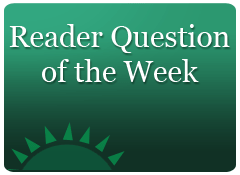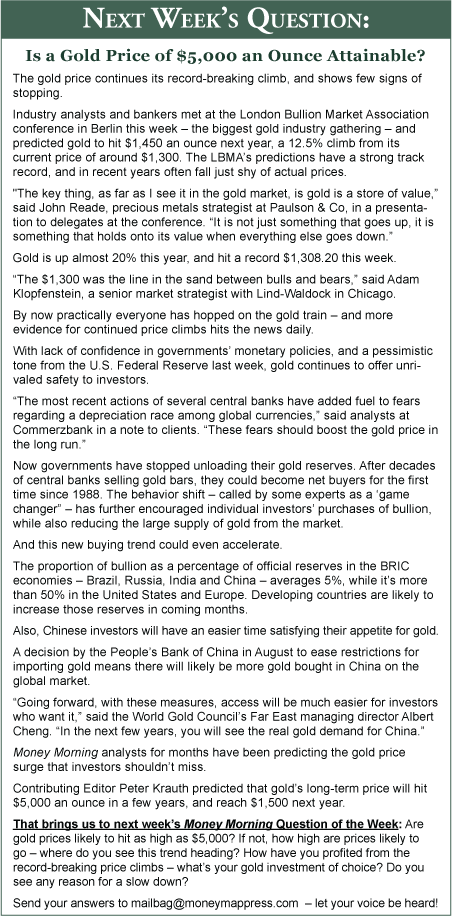After their meeting last week, U.S. Federal Reserve policymakers said they are more worried about deflation than inflation and vowed to look for ways to help along an economy that is experiencing worrisomely slow growth.
In fact, the central bank's rate-setting Federal Open Market Committee (FOMC) said it plans to keep the benchmark Federal Funds rate at its record-low level unchanged between 0.00% and 0.25% for the 20th consecutive month. And, using its go-to line - central bank policymakers said rates could remain that low for "an extended period."
In the near term, that appears justified. Core inflation is running at only 0.9%, below the Fed's comfort-level target of 1% to 2% - where it says the inflation rate needs to be for price stability. Fed Funds futures at the Chicago Board of Trade (CBOT) now show that traders believe there is a 54% chance the Fed won't increase short-term rates until its November 2011 policymaking meeting.
In the interim, faced with a still-wheezing economy, the central bank may even start buying back large blocks of U.S. Treasury bonds - a technique that pushes liquidity out where its needed.
"The question for Fed members is, to what degree can monetary policy help the economy grow from here?" Dan Greenhaus, chief economic strategist at Miller Tabak & Co., told Bloomberg.

The Fed has kept interest rates near zero since December 2008. Keeping interest rates low to spur growth started during the Asian Contagion in 1997, when currency devaluations spread rapidly through Southeast Asia. Markets plunged, as did consumer and investor confidence, and foreign economies adjusted policies and lowered rates to regain footing.
Those lower U.S. interest rates contributed to the dot-com bubble that took off in the late 1990s: Startup money became easy for venture capitalists to obtain, fueling a speculative mania in Internet stocks that crashed in 2000.
When artificially low interest rates combine with rising standards of living, speculative bubbles form. Some analysts and economists have said long periods of low interest rates contributed to the U.S. housing bubble, and fear that another long period of ultra-low interest rates will eventually create more asset bubbles that will disrupt the healthy economic patterns the United States needs to return to.
But the Fed is hesitant to raise rates amid weak data. A report released last week by the National Bureau of Economic Research (NBER) concluded that the most recent recession ended in June 2009. But economic growth slowed to a 1.6% annualized rate in the second quarter, escalating fears of a "double-dip" recession. Unemployment remains at a stubbornly high 9.6% and is projected to stay above pre-recession levels until 2013, according to a report released last week by the Organization for Economic Cooperation and Development (OECD).
"The longer you have weak growth the longer you have no underlying healing in your economy," Ethan Harris, head of North American Economics at Bank of America-Merrill Lynch, told Bloomberg News. "You don't heal the housing market, you don't heal the household balance sheet. By allowing growth to sit below trend, you create a huge window of vulnerability to a shock."
This prompted last week's installment of our Money Morning "Question of the Week": Should the Fed be looking to raise interest rates a lot sooner than is currently planned? Has this long stretch of near-zero interest rates already sown the seeds of another speculative problem down the road? Or is the central bank on the right path, understanding that a boost in rates now will thwart an already tepid and uneven recovery?
Following is a collection of reader responses, highlighting the increasing frustration with the Fed's low interest rate policy and lack of effective economic stimulus.

Raise 'Em
The Fed should raise the funds rate immediately to 1.0%. There are a large number of potential homebuyers who see no need to move as long as mortgage rates remain low for "an extended period."
Also, why buy a house now when many economists predict housing prices are headed lower? Raising rates would give confidence that the economy is beginning to move forward and that no further easing is necessary. Continuing a policy of easing is self-defeating as it implies the economy is in quick sand and not about to recover meaningfully anytime soon. It is time for the Fed to pull a poker bluff to get confidence back.
- No Name Submitted
Low Interest Rates Mean More Pain, No Gain
Maintaining artificially low interest rates, without also tempering the "account maintenance" fees charged by servicing institutions, is devastating investors and savers. An account balance, which until 2008 generated more than enough to cover these fees, now earns only about a tenth of them. It is an account which is closed to future contributions, and it is frustrating to watch its plundering by the institution "servicing" it.
- John P.
Higher Rates Will Move Money
Why are banks not lending to business? Interest rates are low.
When interest rates increase banks will start to lend, the business economy will then start to move.
- Tom B.
Just Give The Money to the People
So if the Fed is serious about helping the economy, instead of giving banks money at
0.0% interest, why not issue 3.0% mortgages directly to the public (a.k.a., the voters)?
Many would refinance, thereby freeing cash to spend on the recovery.
- Bernard L.
Too Much Intervention Already
The Federal Reserve System is an abomination and should be dismantled. The market should decide interest rates, wages and prices. Period.
It is the Interventionist State that has gotten us into our current mess. When are we going to learn our lesson, that Marx had it all wrong, and that there is a reason why places like Switzerland are clean, affluent, and good places to live?
- Thomas K.
And the Meddling Continues
For all of its meddling, the Fed may end up with the worst of all worlds. An inflationary depression much like the Weimar Republic of post WWI Germany. High unemployment and a wheel barrel full of money to buy a loaf of bread, or in present day a "Made in China" article. Go back to the history books, Mr. Bernanke.
- Bob
[Editor's Note: Thanks to all who responded to our previous installment of the "Question of the Week" feature regarding the Fed's decision on interest rates. Be sure to answer next week's question: Is a Gold Price of $5,000 an Ounce Attainable?
Send your answers to [email protected]!
Is there a topic you want to see covered as a Question of the Week feature? Then let us know by e-mailing Money Morning at [email protected]. Make sure to reference "question of the week suggestion" in the subject line. We reserve the right to edit responses for length, grammar and clarity.
Thanks to everyone who took the time to participate - via e-mail or by posting their comments directly on the Money Morning Web site.]
News and Related Story Links:
- Money Morning:
Will The Fed Fall Back on Treasury Purchases to Fuel Economic Growth? - Bloomberg:
Fed Prepared to Ease Further to Revive Economy - The Wall Street Journal:
Fed Worried, but Defers Action - Money Morning News Archive:
Question of the Week Feature


